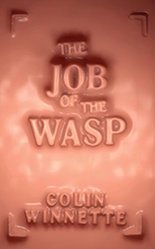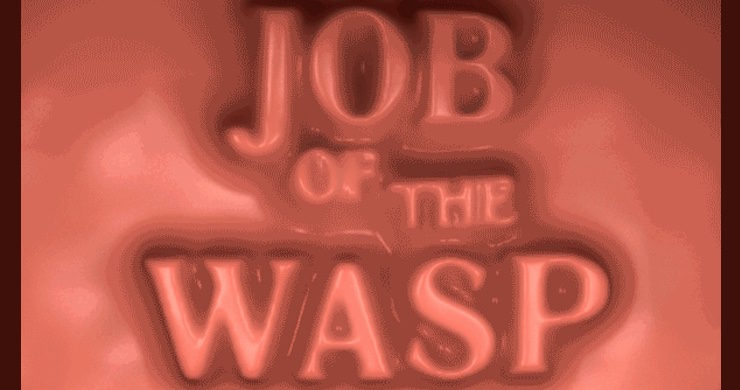The Job of the Wasp stretches the limits of unreliability. Can you have an unreliable narrator, an unreliable setting, and dozens of unreliable supporting characters, any of whom could turn out to be a villain at any moment—or to be the victim to the villainous narrator? It turns out that you can! Or at least, Colin Winnette can, because this book works marvelously as a spooky horror before suddenly becoming a moving tale of alienation.
Buy the Book


The Job of the Wasp
We begin in media res, with our narrator being welcomed into an orphanage. We have no idea what year it is, what country we’re in, or what happened to our narrator’s parents. He expresses no emotion for them, and only seems concerned with fitting in with the other children. We are told by the headmaster that there are now 31 children in the facility, rather than the governmentally-mandated 30. We are told that the narrator is expected to pitch in to keep the facility running, and that his education and care will meet government standards without exceeding them: “You will be provided for, but you will not be comforted. Even if I wanted to comfort you, we have been forced by the economic realities of our situation to live simply.”
When he meets the other children he is blandly hazed by another boy, told that the pork he’s eating comes from pigs who are fattened up on children who don’t fit in, he immediately lashes out rather than laughing it off. He holds the other kids at a distance, doesn’t seek friendship, and seems pretty contemptuous of them. This becomes important for two reasons: as the gothic plot begins to unfold, he has no friends or allies to rely on, and as the book creates its constantly shifting mood, we come to realize that we have no real idea how many kids are at the school, how many weeks or months have passed, or whether anyone can be trusted. Children appear and disappear, new characters show up unexpectedly only to become vitally important before disappearing again, and, oh yeah, there might be ghosts?
And that’s all before the first body turns up.
Yes, I said body, and yes, I said first—The Job of the Wasp becomes pretty brutal as it unfolds, and the bodies do stack up. Our narrator realizes that he’s not safe, but he has no way of knowing whether the murderer is the headmaster, a student, or some hidden intruder, or if there is actually a spectral presence picking kids off, as his classmates believe. And of course given the shifting nature of the story, we readers are never sure that it’s not the narrator himself murdering them all. This works because Winnette’s writing is immaculate. From descriptions of corpses to the inner lives of wasps, I believed every word he gave me. And in our narrator, he’s created a singular voice: prissy, contemptuous, achingly lonely, and darkly funny.
It’s that shiftiness that I’ve kept thinking about since reading this book. Is it possible to build a book on quicksand? Can you take a plot that changes from a Dickensian boarding-school story, to a ghost story, to a locked-room mystery, to a Lord-of-the-Flies-esque examination of mob rule, to a psychological study or alienation? I mean, obviously you can, but will it work, or will your reader just be pushed out of the story completely?
I’ll admit there were a few points where Wasp exasperated me, where I wished I could have one true axis mundi to get my bearings and look at the characters clearly. But in the midst of my exasperation I’d still want to keep reading to see what happened next, and as I read I came to realize that that is the point of the story. We’re living in a time when no one can know anything, really. There is no one news source that you can trust on every issue, there is no one font of truth. By setting this story in a boarding school, a place where a reader can rely on a certain number of tropes, and then subverting those tropes—yes there’s a half-hearted hazing ritual, but then it doesn’t go anywhere; yes, the other kids are mean to the new kid—but there’s a good reason for that, and anyway, sometimes he’s mean to them, too—it kept me as off-balance as the narrator, and guided me into what I can only describe as a paranoid reading experience. This did more to create a proper haunted house tone than any number of spooky ghost noises.
This sense of instability works all the way through, from small interactions between the other kids to his sense of reality itself. At one point, the narrator thinks he may have gained an ally, but in an already unwieldy conversation about ghosts becomes increasingly distracted:
“But what of the ghost here at this facility?” I said. I was growing impatient with Nick and increasingly curious about the wasps, which were still not moving. I wanted to determine, once and for all, if they were as achingly beautiful as they seemed, and the only way of doing that was to disrupt their corpses, to knock them down with something and see what became of them. Would they empty hollowly from their sockets, or would they swarm?
“What is known, said Nick, “is that the facility is haunted.”
We might be in a universe where hauntings are possible, but since all the information is given to us by traumatized children it’s impossible to know—but it doesn’t even matter if the ghosts are real, because this book also places us in a closed society run by children. All that matters is their subjective reality, their beliefs, and what they’re willing to do to create a sense of safety within those beliefs, and as the book unfolds, and the danger increases, it becomes clear that Winnette is telling a bigger story here. This isn’t just a ghost story or a locked room mystery—it’s much more an examination of how we define reality, he we interact with our deepest fears, and how we define our humanity.
But the ghost stuff is also cool, and if you’re looking for a visceral horror experience, this book is a perfect fit for a stormy night’s reading.
The Job of the Wasp is available from Soft Skull Press.
Leah Schnelbach isn’t sure she’d trust a stable reality at this point. Come, discuss ghosts with her on Twitter!










